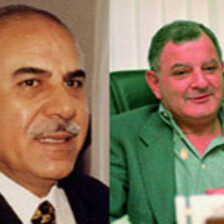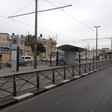The Electronic Intifada Ramallah 20 June 2002
News about reforms in the Palestinian Authority (PA) come from Yasser Arafat’s headquarters, the only remaining section of the bombed out Mukata’a, the sixty-year old British built military compound in Ramallah, which has become an easy target for any Israeli offensive and a symbol for a nation under siege.
Journalists hanging around the Mukata’a trade new information about the proposed reforms like the most recent news that Yasser Arafat had appointed 21 ministers in his cabinet instead of 34.
Chief amongst the cabinet changes was the appointment to Minister of Interior of General Abdel Razak Al-Yehya, who will also be responsible for the security apparatus, which were decreased to four on US recommendation, leaving Mohammad Dahlan, the former head of the Preventive Security in Gaza with nothing but a resignation letter on Yasser Arafat’s desk.
It was not the Palestinian media who carried out news about the reform; instead, non-Palestinian media like Arab Satellite Channels, the foreign media, and the Israeli press first mentioned the name of Abdel Razak Al-Yehya. The Palestinian media was hesitant to discuss the change, although many Palestinian journalists spent much of their time in the Mukata’a gathering news and getting close to PA officials who may one day protect them from harassment by Palestinian security.
While the Palestinian print and broadcast media did, to some extent, analyze the issue of reforms and the future presidential and legislative elections, it was not Palestinian journalists who started the debate but Palestinian academics and political analysts.
The subject of reform is undoubtedly newsworthy for the Palestinian media, but due to the thin line between democracy and dictatorship, is discussed with caution, as the Director General of Publications at the Palestinian Ministry of Information, Hani Al-Masri, explains. “Today you hear people — not only in the streets, but at meetings, on TV and in the papers — voices demanding to get rid of the Palestinian traditional leadership. Nowadays, groups outside the PA control many of the media institutions. Still, sometimes there are misunderstandings, and journalists get beaten up. These incidents are getting fewer, but we are still on the thin line between democracy and dictatorship,” he comments.
Al-Masri admits that the harassment of Palestinian media by Palestinian security forces is a result of the absence of the rule of law, but he still believes that this will change after President Yasser Arafat’s ratification of the Basic Law and the Independence of the Judiciary Law. “In principle, the Palestinian media are guaranteed freedom of expression, as stated in the Publications Law of 1995. Contrary to all the stories you might hear about journalists being brought in by the security forces and being beaten up for stories they wrote or things they said on TV, the picture is not all that dark” says Al-Masri.
Compared to such laws in other Arab countries, the Palestinian Publications Law is a liberal law - but only on paper. Officials at the Ministry of Information and in the security forces keep an eye on the Palestinian media, watching and waiting to intervene at the right time when they judge that what is being published or broadcast “threaten the Palestinian security” or “the Palestinian supreme national interests,” which makes it difficult to say that the Palestinian media are free.
On May 29, 2002, Palestinian President Yasser Arafat ratified the Palestinian Basic Law. Article 27 of this law grantees the freedom of media: “Freedom of audio, visual, and written media, as well as freedom to print, publish, distribute, transmit, together with the freedom of individuals working in this field, is guaranteed by this Basic Law, other related laws.”
Moreover, the same article states: “Censorship on media shall be prohibited. No warning, suspension, confiscation, cancellation, or restrictions shall be imposed on media except by law, and in accordance with a judicial order.”
Palestinian media suffer not only from the harassment of the PA and its security forces, who often invited outspoken and critical Palestinian journalists for a ‘cup of coffee’, but also from other unofficial groups. This role, says Al-Masri “has been taken over by local, radical groups, who are often no more than ordinary thugs and bullies outside of the control of the PA, who harass the journalists.”
The duty of monitoring and censoring what the Palestinian media say, therefore, is not limited to the security forces but also taken up by local communities, militant groups, and political parties, leaving Palestinian journalist with inescapable self-censorship. Therefore, only few journalists dare to talk about militants groups, for example, in order to avoid the trouble, as one Palestinian journalist said, under condition of anonymity: “Today, you can criticize everybody, but you do not do it, as you will not know who might be waiting in your kitchen, when you return from work”. Only such reactions would require a journalist to speak under the condition of anonymity.
Palestinian media would be the first to benefit from the reforms that are not only newsworthy but a test to the ‘fourth estate’ in Palestine, which has the duty to examine the credibility of these reforms and later to take a leading role in oversight. The question is how can Palestinian media play this role at the time when the media are in need of reforms?
The blame for the problems plaguing the Palestinian media cannot be place solely on the Palestinian Authority, its security forces, militant groups, local communities, political parties, or any other external elements. The media are also responsible for this suffering and, therefore, the Palestinian media should be self-critical, an argument made by Al-Masri in his recent article “On the road to reforms: The Ministry of Information as an example,” published in Al-Ayyam daily newspaper (May 18, 2002).
Maybe the first step that Palestinian media should take is to reform its own house, the Palestinian Journalists Syndicate, by putting aside personal and political disagreements and reforming its standing orders and membership requirements to include all media professionals (film makers, photographers, sound technicians, etc.) and not necessarily only journalists.
Another step would be to conduct new elections as soon as possible, as recommended by the Palestinian Legislative Council’s document on reforms released on May 16, 2002: “all representation institutions, such as the civil society institutions, have to abide and hold the regular elections in their set dates, such as trade unions, professional unions, charitable organizations and all other institutions according to their bylaws”. Candidates for the chair and board of the Journalists Syndicate should be actively employed in the media.
A unified syndicate or union in the West Bank, the Gaza Strip, and Jerusalem should also be set up. While some may say a unified union is impossible because of the Israeli movement restrictions, the media are always creative linking peoples from all over the world.
Reform is widely required in the official Palestinian media including the Palestinian Broadcasting Corporation, the Palestinian Satellite Channel, Palestinian News Agency (WAFA), the State Information Service, and the Palestine Media Center. These institutions must be re-structured to meet professional standards and not political or factional standards and hierarchical systems that can only ‘de-professionalize’ the official media.
The margin of freedom in the Palestinian private media is wider compared to the official media. According to Hani Al-Masri who grants the private media licenses to work, “the Palestinian Authority has allowed private media in Palestine, especially the broadcast media, firstly because it wanted to create facts on the ground for future negotiations with Israel in terms of occupying as radio frequencies as possible. Secondly, the PA was afraid that Israel may, at some point, close down or attack the government-owned broadcasting corporation. Thirdly, the people at the Ministry of Information, especially the Minister, believe in freedom of expression.” Such ‘flexibility’ has resulted in an overcrowded private media.
In a study entitled ‘Private Television in Palestine’ submitted for my MA in Mass Communication, I developed some recommendations that are worth considering when making the reform in the field of the broadcast media in Palestine. The recommendations include:
* On-the-job training at private television stations. Training must be planned directly with training institutions in the field of journalistic development, programming, production and production planning, maintenance of equipment, and development of locally produced advertising. By including the latter, stations can improve their commercial status and thus the sustainability of a permanent financial recourse.
* Networking among stations and the merger of small stations with large ones. Networking will strengthen the democratic role of private television stations by giving their viewers access to more and better programs as well as programs from other areas of Palestine.
* The eventual merger of smaller with larger stations. Since the market will only allow strong well-established stations to exist, it is recommended that small stations merge with larger ones for the benefit of the stations themselves and the public instead of closing down.
* Mandatory membership of the media private sector in the Syndicate (after the syndicate is reformed). If currently not possible, the Union of Private Television and Radio Stations must be reactivated and elections must take place.
* Membership rules for the Union of Private Television and Radio Stations. If these rules are violated, membership must be withdrawn. The Union must take an active role providing benefits and defending its members, which would make media agencies reluctant to violate rules and risk losing their membership.
* Fixed rates for advertising costs. Since advertising is the main source of income for the private sector and is also a basic rule for competition, the Union must announce a fixed price for a commercial per minute and set the quality and duration.
* Increased and varied local production. The Broadcast media must increase and vary its local production in order to stop ‘piracy’ from satellite channels.
As for the relevant Palestinian official parties, the Palestinian Legislative Council (PLC) must amend as soon as possible the Publications Law that was issued by a Presidential Decree in 1995 before the PLC was elected. The new law should include the audio-visual and electronic media and must not contradict the Basic Law. The PLC is also required to issue the Copy Right and Intellectual Property Law for its importance.
The Palestinian Ministry of Information - that was ‘born dead’ according to Al-Masri’s recent article - is in fact now officially dead, following its merger with the Ministry of Culture as part of the reform in the Palestinian Cabinet. The Ministry must re-structure itself to meet the new changes and cooperate with Palestinian media professionals and the PLC to issue a progressive media law. (Although I am against a media law, such a law will be able to limit the interference of security forces). The Ministry should be the only reference to Palestinian media professional and should facilitate the work of media, in cooperation with other ministries like the Ministry of Telecommunications. Restructure and reform of the Palestine media Center are also required otherwise it is ‘cloning’ of the ministry.



